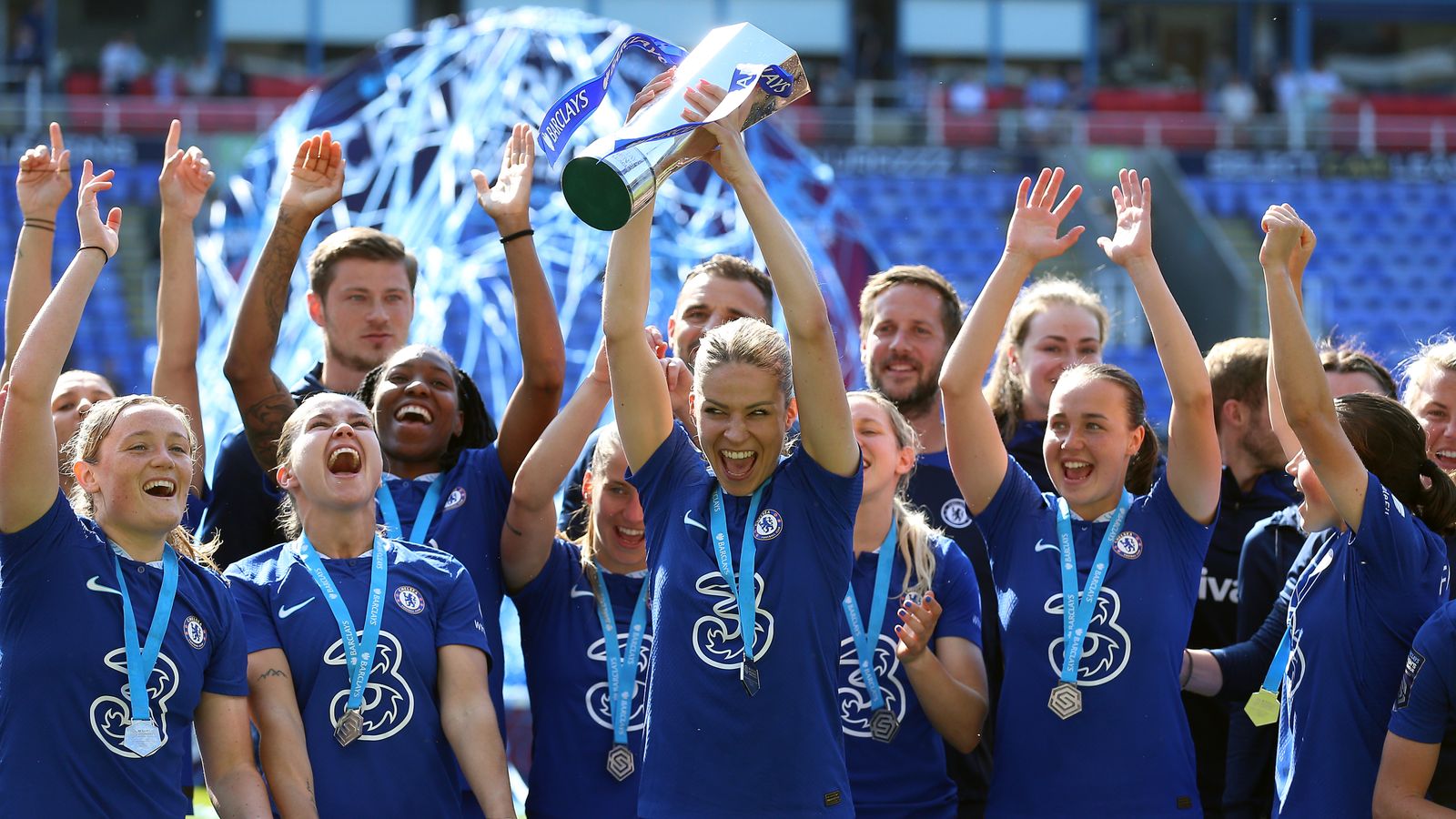Encouraging a Glastonbury feel at matches. Expanding a passionate – not poisonous – fan base. Generating more cash for clubs and players.
As women’s football launches into a new era, the new boss of the English leagues is on a growth mission.
And for the first time it will be clubs running the show with the Football Association relinquishing control next season to a new venture led by Nikki Doucet as CEO.
The men’s game shows the revenue potential – but she looks more to growing women’s football with a distinctive vision.
“Women’s football doing well is good for everybody,” Ms Doucet told Sky News. “I don’t know that the men’s game has to give stuff up. This isn’t about taking. This is a unique product with a unique fan base.
“And yes, of course, there’s a certain level of cross-over and it’s the same sport. But equally we’re carving our own path.”
With commercial to business management experience, Ms Doucet will be bringing expertise from Citibank to Nike to elevate the Women’s Super League (WSL) and Championship to a new level.
She told Sky News: “Our mission for the new company is to build the most distinct, competitive and entertaining women’s football club competition in the world for the fans and the players of today and tomorrow.”
The FA has run the WSL since its launch in 2011 and, since 2018, teams have to be fully professional. Half of the 20 Premier League clubs are represented in the smaller, 12-team WSL.
The aim is to build on the success of a national team that has reached two consecutive finals – with the FA-run Lionesses winning the Euros and finishing runners-up at the World Cup.
That requires attracting more fans and convincing broadcasters and sponsors to pay more.
“In some ways we’re learning,” Ms Doucet said. “We don’t have intergenerational fans or fandom.
“There’s not intergenerational knowledge of the women’s game yet. And I think we’re at the beginning of that journey.
“So I think the experience of going to a women’s match, I see it as kind of like Glastonbury.
“It’s a festival feeling, it’s welcoming, it’s fun, it’s competitive, it’s passionate, and I think people want to be part of that.
“So the more people get to experience that, I think the more they will want to come back and be part of it.”
That ultimately brings more cash flowing into clubs to raise the salaries of players. So, one day, they are also earning the millions of pounds banked annually by Premier League players rather than salaries mostly below £100,000 in the WSL.
“Men’s football is valued based on revenue and we have to prove that women’s football can generate revenue,” Ms Doucet said. “And I think we have a stronger argument, like the women’s US national team did with their argument, because of that particular fact.
“So I think there’s opportunities in the future, and I think it’s something that we all hope and aspire to get to.”
More appealing locations for matches can help. It is still a rarity for clubs to use their main men’s stadiums for women’s matches rather than less accessible, smaller venues.
But then there’s the challenge of growing a new football fan base or hoping more fans of men’s teams also take in women’s games.
So, from her consultation work, what do supporters want?
“The fans are saying it’s the passion without the poison,” Ms Doucet said. “They want to engage more. They love these players. I think they’re incredible role models. The fans want accessibility and they want to make it easy to watch.”
Finding dedicated broadcast slots for women’s matches – without competing against domestic men’s matches – is a challenge.
That is currently achieved on Sunday nights by Sky Sports, although the kick-off time makes it harder for families to travel to stadiums.
There have previously been calls within the FA – and from the government’s review into women’s football – for the WSL to be allowed to broadcast matches on Saturdays in the current 2.45pm – 5.15pm blackout period for any live football.
The restriction is in place to protect attendances in the men’s lower leagues and the slot has been used since the 1990s by Sky – the parent company of Sky News – to air the popular Sky Sports Soccer Saturday programme going around stadiums for updates without showing any action.
“I think we need to find the right slot for the women’s game that allows the fans access and to be able to watch as easily as possible,” Ms Doucet said.
There are ambitions to catch up with the wealth of the men’s game without feeling a need to replicate the Premier League.
Whether carving out a distinct identity requires a WSL rebrand is yet to be determined by Ms Doucet.
Only women’s competitions tend to specify the gender of participants. Perhaps it is the time for “men’s” to be affixed to competition names like the FA Cup? Or for both top flight leagues to be known as the Premier League?
Ms Doucet highlights changes in the highly lucrative college basketball competitions in the United States where only two years ago the Women’s Basketball Championship adopted the March Madness Final Four branding previously used only by the men’s event.
“I think what the NCAA has done recently is really interesting,” Ms Doucet said. “So you have the men’s Final Four and the women’s Final Four and that’s worked for them.
“So I think it depends on what the strategy is and what makes sense for that particular market.
“I think we’ll explore what the right possibilities are in the future if we choose to look at a rebranding.”
Read more:
Rubiales should stand trial over World Cup kiss, says judge
Wiegman extends England contract
Women’s football revamp thrown into doubt after rebellion
Be the first to get Breaking News
Install the Sky News app for free
For now Ms Doucet is leading an operation known as NewCo.
“I think the priorities are to set up the structure and the team so that we’re communicating really well and we’re listening to the voice of the athletes, what the clubs are saying and what the fans are saying,” she said.
“And we’re starting to really create decision-making off the back of that.”








